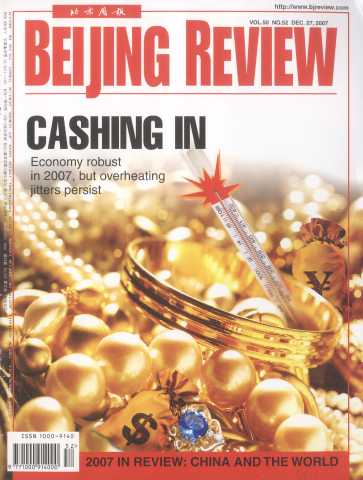So far this year China's central bank has raised interest rates six times and increased the reserve requirement ratio for commercial lenders 10 times. Anyone with even rudimentary economic knowledge will realize immediately the implications of these efforts: to curb an overheating economy and rein in the risk of inflation. Facts and figures have proved these regulatory measures are by no means based on groundless fear. The National Bureau of Statistics (NBS) has put the growth of the consumer price index for November at 6.9 percent, the highest in 11 years, in addition to the rising producer price index at a two-year high of 4.8 percent. This had followed a steady increase in the index since earlier this year, from 3.3 percent in March to 6.5 percent in October, well surpassing the 3 percent ceiling expected by economists and the government. The surging prices of some non-foodstuffs, including fuels and industrial goods, are an indication that inflationary pressure is building up and may require more tightening of regulations in the days ahead.
Along with this looming inflationary threat are some other unwelcome tendencies, ranging from over-investment and loose credit to swelling foreign trade surpluses. Many economists have defined these as "structural problems," ascribing them to excess liquidity originating from years of booming economic growth, ballooning foreign reserves and large inflows of hot money from abroad. Others also have blamed the country's extensive growth pattern that relies on investment much more than consumption, the existing export-oriented trade policy that has helped to induce mounting pressure on the renminbi's appreciation, and soaring prices of some capital goods in the global market.
Fully aware of these unhealthy economic phenomena in the nation's economy, the Chinese Government has designed a series of macro readjustments for next year. These include, among others, tightening monetary policies, regulating consumption, and modifying investment and foreign trade growth. Clearly, these measures are aimed at preventing the economy from overheating and bringing growth onto a more coordinated and sustainable track. Apart from these, the government has also come up with the essential task of keeping at bay commodity prices, including those closely associated with people's lives, such as foodstuffs and housing. This could well be a priority for China in 2008, since maintaining stable prices is a key to securing steady and sustained economic growth as well as ensuring greater harmony in social development.
Despite these negative elements, the general economic situation fared nonetheless pretty well in a number of respects through 2007. Gross domestic product (GDP) rose to 11.5 percent in the first three quarters and, according to forecasts by the Chinese Academy of Social Sciences, will top 11.6 percent for the whole year, meaning China will have experienced a double-digit growth rate for five consecutive years. In the meantime, both fixed-assets investment and foreign trade registered steady growth, up by 25.7 percent and 23.5 percent, respectively, and consumption also picked up steam, accounting for 37 percent of GDP, compared with 35.7 percent a year ago. Moreover, the government has laid greater stress on more diversified and effective macro-control measures to rectify the economic order, shutting down energy-devouring enterprises, reducing hazardous pollutant emissions in the industrial sector, cutting interest tax for bank savings and lowering export rebates for 2,268 commodities liable to cause trade friction.
Through opportunity and risk the Chinese economy will soon be entering another year. Most likely, it will continue to grow at a fast pace but in a more rational and healthy environment. That is good news for both China and the world economy.
Have a comment, complaint or question? Beijing Review welcomes your feedback. E-mail our editorial team at contact@bjreview.com.cn or write to us at Beijing Review, 24 Baiwanzhuang Lu, Beijing 100037, China. Letters may be edited for length or content.


 Copy Reference
Copy Reference